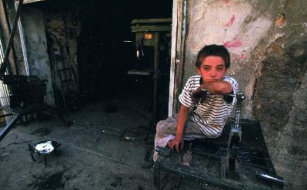Crisis Will Increase Child Labour

Child labour means forcing children to work in conditions not suitable to their age. It represents a violation of, among others, the children’s rights to education, development and health. The most obvious reason for child labour is poverty, as they are forced to contribute to the family income. The children’s families see them as a means of earning money, but the negative consequences are great.
Social effects of crisis ignored
The economic crisis of 2008 has had serious effects in Turkey. Most commentators on the crisis have focused on the economic context; apart from unemployment, the effects on society have not been dwelled on. While this article does not aim at discussing all social effects, it will discuss child labour. The basic argument is that the economic crisis in Turkey will lead to an increase in child labour.
Parental unemployment primary reason
The primary reason for this increase is that the parents become unemployed. Even if they keep their jobs, the increase in poverty is pushing families to find new solutions to deal with the effects of the crisis. These solutions include women working in temporary low-pay jobs or making children work. Even if children initially work and continue their education, the work means that they will not be able to concentrate on school and that they will be tired and worn out.
Street work attractive
If one looks at different types of child labour, the highest rise is predicted in street work. Children working in the street bring more money and this sector is thus more attractive to families. Here it is vital to replace the attraction of the streets with the attraction of education and make families aware of this. For this, the child and youth centres of the Social Services and Child Protection Agency (SHÇEK) need to work properly. Currently these centres are working, but the crisis means that their role becomes much more important. Social work experts working in these centres must make it their priority to visit families, explain the damage that child labour causes and emphasise the importance of education.
Parents' jobs need to be safeguarded
Permanent
solutions to child labour can only be found if the adults in a family are not
unemployed. This is the duty of a social state. A social state does its best to
prevent employers from laying off workers during a crisis, and, in the case of
unemployment, support the unemployed individuals and their families. Families
thus supported would not push their children into work, and the family would
continue to function well.
A social state needs to intervene
In order to prevent the dismissal of workers, the social state should put a temporary stop to the social security contributions and taxes that employers have to pay for their employees. A truly social state would have to allow for these costs. Another suggestion would be to support the education of children whose parents have lost their jobs. This educational support would have to be higher than the money a child could earn in order to act as a deterrent to child labour.
The claim that the economic crisis has a negative effect on child labour will be verified or falsified by future child labour statistics. I hope that there will be no need for further articles on child labour…(EE/EÜ)
* Ercüment Erbay is a research assistant at Hacettepe University, Social Work Department.







